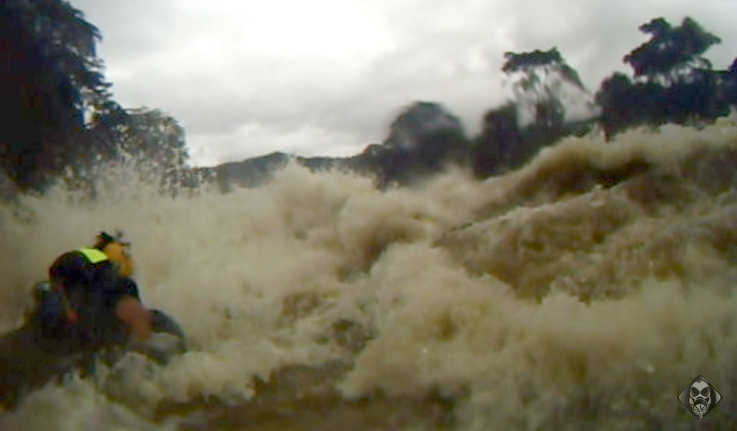For a whitewater athlete, the best kind of river is one that doesn’t stop. There’s no flatwater (of course), but I’m not even talking about a pool-and-drop type of canyon with fun waterfalls – no, the best kind of river is one that is nonstop crashing chaos from put-in to take-out.
The Rio Reventazon in Costa Rica was like this (pictured above, my brother riverboarding it as seen from my helmet cam POV), before multiple dams were constructed, effectively killing the entire thing (viva el pais mas verde y eco-friendly del mundo! jaja).
There’s another one in Indonesia with similar characteristics though, to illustrate:
That’s a lot like life. The older I get the more I’m realizing circumstances just keep changing, new opportunities and challenges never stop presenting themselves, and there’s rarely an eddy to catch my breath in between.
On the positive side, like a whitewater rollercoaster this makes life fun – constant action. The downside is that sometimes what’s next isn’t usually visible and it could be horrifying madness.
Or it could simply be more of the same fun constant action.
But there’s no way to eddy out and scout – I’m reliant on the beta I got from those who’ve gone before, on what little scouting I could do from far above the canyon (which is never remotely accurate in terms of speed, size, or intensity), and on my ability to change and adapt in the flow.
If something goes wrong, this kind of river is too wide for a throwbag from shore. Nobody’s coming to my rescue, not even the guys I’m in the water with, because they’re all dealing with the same waves and currents that I am, and when things go wrong, there’s usually nothing anyone can do anyway.
This is one of the reasons Xsports4vets has used riverboarding to help military veterans with PTSD – it has a similar individual-in-the-midst-of-chaos adrenaline profile to the battlefield (from what I’m told).
Learning to not only excel at a sport like this, but to actually enjoy it, increases one’s ability to deal with stresses of normal life a little better. I would imagine that someone who excels at wingsuit proximity flying might have an extremely high tolerance for stress, even more than a whitewater athlete.
Yes, time just keeps moving. The future is determined in part by what I’ve learned from and do with the past, in the present moment. And whether I’m on my game or screwing up royally, it just keeps coming. So why stress over it?
A skill to gaining a measure of control over a raging river is to exceed the speed of the current. At that point, there are more options on the line the athlete can take, rather than just being swept along by the flow.
This takes what is already rapid-fire decision-making, and speeds it up considerably. But through quicker decision-making comes a greater degree of control over direction, and over changes in direction.
In essence, it slows the raging river down.
I’ve read many times that great leaders make decisions quickly and change their minds slowly. From a whitewater mindset, this makes complete sense.
Choosing quickly and then moving that direction at full speed in a rapidly-moving stream of endless decisions might seem like a recipe for disaster, but…the more self-inflicted disasters one survives from poor decisions, the more one learns to make them differently – and better – the next time around!
And they will come around again. But with improved ability comes greater enjoyment of the journey.
Even more, making successful decisions after a mistake tends to strengthen the brain’s ability to master a skill, more than even just making the right decision in the first place (The Talent Code).
To me it seems there’s only two options – life just keeps moving at full force, so I either must learn to develop skill and gain a measure of control of my direction within the flow, or if I apply the brakes / stress over what’s coming / wait to be saved, it’s going to take me somewhere I probably don’t want to go.
I’d rather accept the challenge to learn the lessons and get to the journey-enjoyment part as quickly as possible. Trepidation of what’s beyond the horizon isn’t beneficial and frankly it’s miserable.
But approaching those unknown horizons full-speed, knowing you’re capable of styling whatever line you must make, and then the deep and gratifying exultation on the other side of it, well…that’s what makes life worth living.

